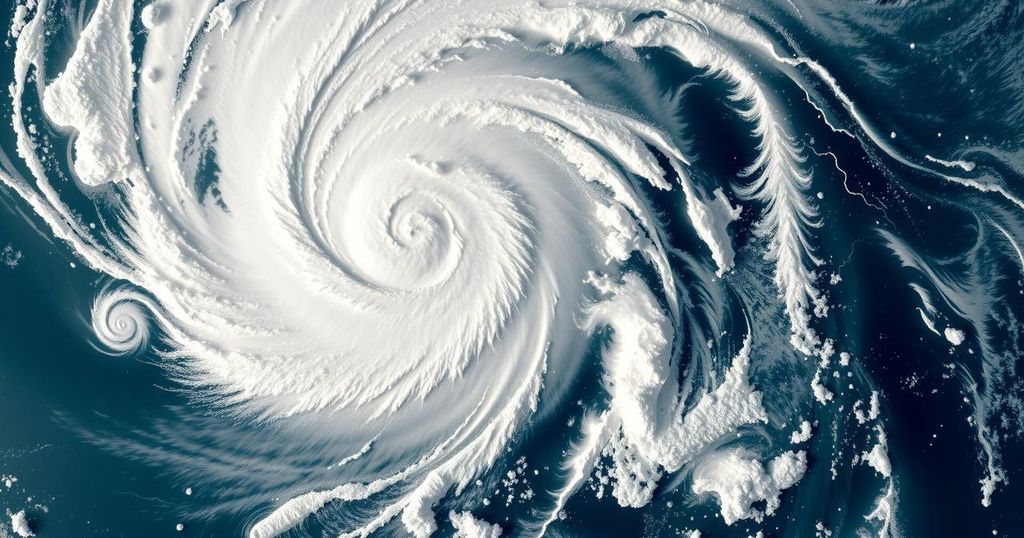Tropical Cyclone Chido has severely impacted Mayotte, causing extensive damage and prompting emergency alerts. The cyclone, with winds surpassing 220 km/h, has led to power outages and structural destruction, contributing to widespread concern as it progresses toward Mozambique, where millions may be affected. Emergency services are active in recovery efforts, and surrounding areas, including Comoros, are also grappling with severe weather conditions.
Tropical Cyclone Chido has caused significant devastation in Mayotte, a French territory in the Indian Ocean, as it advances toward northeastern Africa. With winds exceeding 220 kilometers per hour, Chido has torn roofs off buildings in Mayotte, which has a population of approximately 300,000 across its two main islands. Fortunately, officials have reported no immediate casualties. Mayotte Prefect Francois-Xavier Bieuville described the cyclone as the most violent since 1934, indicating many residents had lost everything, prompting an emergency response for cleanup and rescue once the storm subsides.
Mayotte remains on red alert, and residents are advised to stay in secure shelters, with emergency services being the only personnel permitted outdoors. The French Interior Minister Bruno Retailleau confirmed the extent of the damage observed thus far, stating that both state and local emergency services are fully engaged in relief efforts. Thousands of homes have lost power, and many structures, including tin huts, have been obliterated. To assist in recovery, 110 rescuers and firefighters have been deployed, with an additional 140 personnel expected on Sunday.
The cyclone is also wreaking havoc on the neighboring Comoros archipelago, prompting red alerts in certain regions. Authorities are particularly concerned for a group of fishermen who have been unaccounted for since venturing out to sea. Consequently, maritime activity has been restricted, and airports and schools have closed in preparation for the cyclone’s impact.
Chido is anticipated to continue its path toward Mozambique, potentially affecting approximately 2.5 million individuals in the northern provinces of Cabo Delgado and Nampula. Landlocked nations like Malawi and Zimbabwe are also bracing for potential flooding, with Malawi urging residents to seek higher ground. The cyclone season, spanning from December to March, has historically presented severe challenges for southern Africa, with Cyclone Idai in 2019 and Cyclone Freddy last year resulting in considerable loss of life and extensive infrastructural damage.
The ramifications of such cyclones extend beyond immediate flooding and damage, as stagnant water can precipitate outbreaks of cholera, dengue fever, and malaria. Reports indicate that climate change is exacerbating the severity of these storms, burdening already vulnerable nations that contribute little to global emissions with significant humanitarian crises.
The occurrence of cyclones in southeastern Africa is a significant concern, particularly from December to March, which constitutes the cyclone season. Mayotte and surrounding regions are susceptible to devastating storms, and past events such as Cyclone Idai and Cyclone Freddy have highlighted the severe consequences that follow. These cyclones often result in loss of life and can facilitate the spread of waterborne diseases due to subsequent flooding. The current storm, Cyclone Chido, exemplifies the growing intensity of such weather phenomena, which climate change is believed to accelerate.
In summary, Tropical Cyclone Chido has inflicted severe damage on Mayotte and is advancing towards Mozambique, affecting millions in its path. The immediate aftermath has revealed significant structural devastation, while local and national emergency services mobilize for rescue and recovery. The consistent intensity of recent cyclones raises concerns regarding climate change’s impact on weather patterns, further exacerbating the challenges faced by vulnerable populations in southern Africa. Authorities continue to work diligently to mitigate the adverse effects of this natural disaster.
Original Source: www.voanews.com






